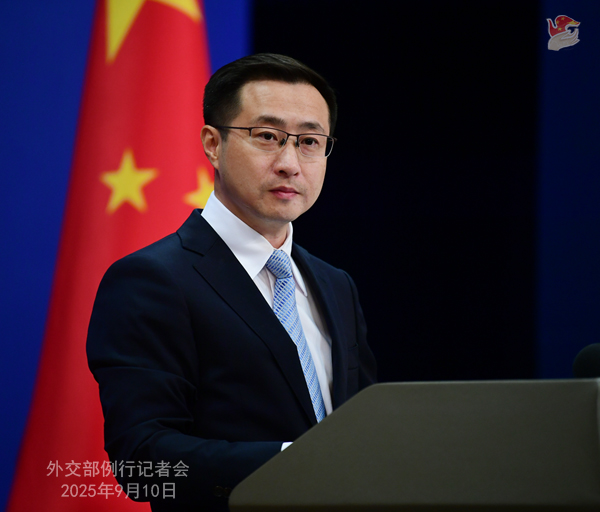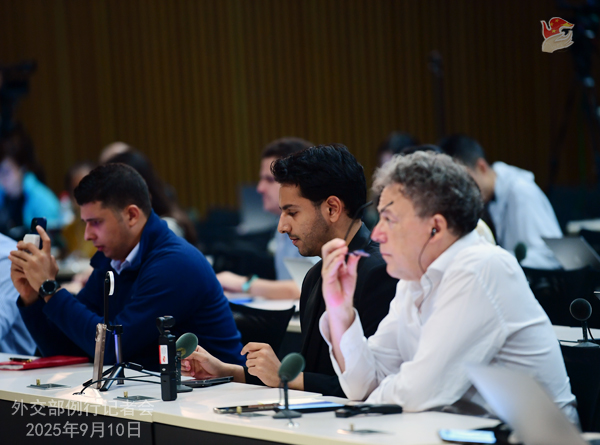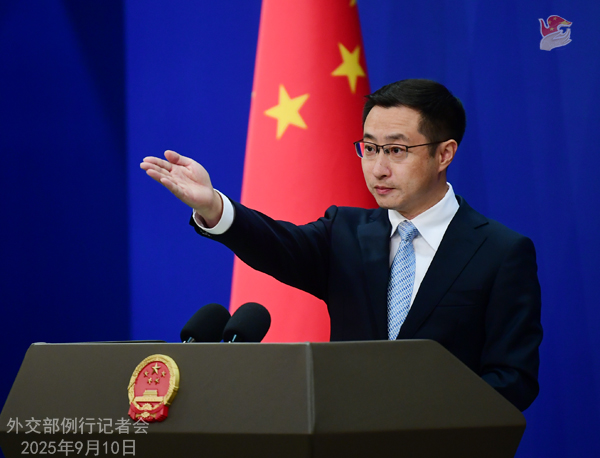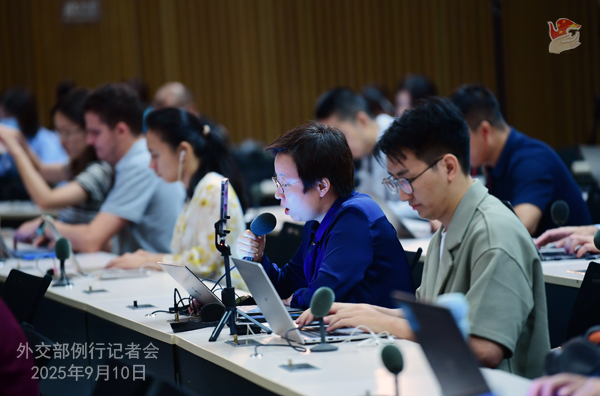
People’s Republic of China


At the invitation of Austrian Federal Minister for European and International Affairs Beate Meinl-Reisinger, Slovenian Deputy Prime Minister and Minister of Foreign and European Affairs Tanja Fajon, and Polish Deputy Prime Minister and Foreign Minister Radosław Sikorski, Member of the Political Bureau of the CPC Central Committee and Foreign Minister Wang Yi will visit Austria, Slovenia and Poland from September 12 to 16.
China-Arab TV: On September 9, Israel attacked Qatar’s capital Doha. The attack targeted the Hamas leadership. What is China’s response?
Lin Jian: China strongly condemns the attack yesterday in Doha, Qatar and firmly opposes Israel’s violation of Qatar’s territorial integrity and national security. We are deeply concerned that the attack could lead to further escalation in the region and disapprove of the actions taken by relevant parties to deliberately jeopardize Gaza ceasefire talks. Use of force will not bring peace to the Middle East. Dialogue and negotiation is the fundamental way out. It will soon be two years since the conflict broke out in Gaza. China strongly calls on relevant sides, especially Israel, to make an effort to end the fighting and resume talks, instead of the other way around.
Global Times: It’s reported that Israel notified the U.S. about its air strikes against Hamas in Doha, Qatar, before the attack. What’s China’s comment?
Lin Jian: We are deeply concerned over relevant reports. Israel’s air strike on Hamas targets in Doha severely violated Qatar’s territorial sovereignty and national security and will escalate the tensions in the region. This has everything to do with the deeply tilted position of certain non-regional country on the Middle East issue. We urge certain major country to act in the interest of regional peace and stability, adopt a just and responsible stance, and work with the international community to play a constructive role for stopping the conflict and easing the tensions.
Shenzhen TV: You just announced that Foreign Minister Wang Yi will visit Austria. How does China view the current China-Austria relations and what is China’s expectation of this visit?
Lin Jian: China and Austria are friendly strategic partners. Since the establishment of diplomatic relations 54 years ago, China-Austria relations have enjoyed sound development. Under the strategic guidance of the two heads of state, the two sides have achieved positive cooperation outcomes in such fields as politics, economy and trade, and culture, and maintained close communication on international and regional affairs.
This is Chinese foreign minister’s another visit to Austria in seven years and also the first in-person interaction between the two foreign ministers after the new Austrian government was formed. During the visit in Austria, Foreign Minister Wang Yi will hold talks with Foreign Minister Beate Meinl-Reisinger and they will have in-depth exchange of views on deepening bilateral and multilateral cooperation. Next year will mark the 55th anniversary of the establishment of diplomatic relations between China and Austria. China is looking forward to consolidating political mutual trust, expanding common understandings on cooperation and enhancing friendship with Austria through this visit. A more stable and mature China-Austria relationship will facilitate the development of both countries and promote the positive development of China-EU relations.
UOL: Can you comment on the violent demonstrations, fueled by social media, that we’ve seen in Thailand, Indonesia and now Nepal? How is China responding to these new challenges in Asia?
Lin Jian: China always hopes that our neighboring countries maintain stability and development. This is in regional countries’ interest and desired by the international community.
Bloomberg: It was reported that President Donald Trump told European officials personally that he’s willing to impose sweeping new tariffs on India and China to push President Vladimir Putin to the negotiating table with Ukraine — but only if EU nations do so as well. Would the Foreign Ministry like to comment?
Lin Jian: China’s position on the Ukraine crisis is objective and just. China did not create the crisis, nor is China a party to it. We oppose making an issue of China or imposing so-called “economic pressure” on us.
CCTV: It’s reported that protests and demonstrations erupted in Nepal recently and the country witnessed some political developments. What’s China’s comment?
Lin Jian: China and Nepal are each other’s traditional friends and close neighbors. China hopes that the various sectors in Nepal will approach the domestic issues properly and restore social order and national stability soon.
We have advised Chinese nationals in Nepal to exercise caution for safety.

China News Service: It’s reported that in response to China’s countermeasures on Japanese Councillor Shi Ping, Japan’s Chief Cabinet Secretary Yoshimasa Hayashi said on September 8 that China’s action that appears to intimidate those with differing views was absolutely unacceptable, adding Tokyo has, through diplomatic channels, requested Beijing swiftly withdraw the measures. Shi said that he had “no assets in China or any intention of going there either,” and China’s sanctions show his political activities in Japan are right and symbolize an honor. Representatives from the Japan Innovation Party said they will lodge a protest. It’s reported that China’s countermeasures on a Japanese councillor, the first of its kind, may escalate the tensions between the two countries. What’s China’s response?
Lin Jian: Shi Ping is definitely not plainly one of “those with differing views.” He used to have Chinese nationality. After he moved to Japan where he acquired Japanese nationality, to realize his selfish interest, he readily showed allegiance to those who are anti-China in Japan by unleashing disinformation and vilification against China and paying respect to Yasukuni Shrine after being elected a member of Japan’s National Diet. What he did seriously violated the principles of the four political documents between China and Japan and the one-China principle, constituted grave interference in China’s internal affairs, and undermined China’s sovereignty and territorial integrity, which makes him a downright anti-China element.
China’s countermeasures on Shi Ping are fully in line with China’s law and international practices and aimed at defending national interests. These measures are right and just. The Japanese government, instead of putting a check on the wrongful words and actions of members of the Diet that go against the four political documents between China and Japan, is pinning the blame on China. China firmly rejects that and has made serious protests to Japan.
CCTV: It was reported that Iranian Foreign Minister Seyed Abbas Araghchi said in a statement on September 9 that Iran and the IAEA have reached understanding on resuming cooperation on safeguards. IAEA Director General Rafael Grossi said that the two sides had agreed “on practical modalities to resume inspection activities in Iran,” and “this is an important step in the right direction.” What is China’s comment?
Lin Jian: China welcomes the understanding reached between Iran and the IAEA to resume cooperation on safeguards—a positive step towards deescalation on the Iranian nuclear issue and rebuilding confidence among the parties.
Despite the progress made, the situation regarding the Iranian nuclear issue remains fragile. China calls on parties to step up diplomatic effort, engage in constructive dialogue, avoid moves that may escalate tensions, resume negotiations and reach a just and lasting solution that takes into account the legitimate concerns of all parties at an early date.
Ukrinform News Agency: A question on the Russian-Ukrainian war issue. Yesterday Russian forces carried out an airstrike on the village of Yarova in the Ukrainian Donetsk region. Russia, a member of the UN Security Council, committed this attack on the opening day of the 80th session of the UN General Assembly. Can the Ministry provide a comment on this tragedy? And in the same context, China and many Global South countries are calling for deescalation in the Russian-Ukrainian war and negotiations. Ukraine is ready for negotiations, but Russia continues to attack, every day and night, launching missile and drone strikes. Can China and other Global South countries convince Moscow to stop escalating the war and sit down at the negotiating table?
Lin Jian: China’s position on the Ukraine crisis is consistent and clear. Dialogue and negotiation is the only viable way out of the crisis. We call on relevant parties to follow the principles of no expansion of the battlefield, no escalation of fighting and no fanning the flames by any party, promote deescalation, and accumulate conditions for the political settlement of the crisis.
CCTV: To follow up on Foreign Minister Wang Yi’s visit to Slovenia, what’s China’s comment on its current relations with Slovenia? What does China expect to achieve through the visit?
Lin Jian: Slovenia is China’s good friend and partner in Europe. Over the past 33 years since the establishment of diplomatic ties, China-Slovenia relations have maintained a sound momentum of development. In recent years, under the strategic guidance of the leaders of the two countries, China and Slovenia have deepened exchanges at various levels, achieved fruitful results in cooperation in trade, investment, tech innovation, education, sports and other fields, and had effective coordination in the UN Security Council and other multilateral forums.
This is the Chinese foreign minister’s another visit to Slovenia in six years. While in Slovenia, Foreign Minister Wang Yi will have talks with Slovenian Deputy Prime Minister and Minister of Foreign and European Affairs Tanja Fajon. Through the visit, China stands ready to work with Slovenia to act on the important common understandings reached between the leaders of the two countries, enhance political mutual trust, strengthen results-oriented cooperation, and promote the sound and steady growth of China-Slovenia and China-EU relations.
Bloomberg: Sri Lanka is to receive a loan to resume a stalled highway project. The loan partly replaces a loan agreement that Sri Lanka reached with the Export-Import Bank of China in 2019. Could the Foreign Ministry confirm it?
Lin Jian: China and Sri Lanka are traditional friends and neighbors. The two countries have worked with each other on the basis of equality and mutual benefit and conducted high-quality Belt and Road cooperation. China stands ready to do what it can to help with Sri Lanka’s socioeconomic development. For anything specific on the cooperation, I’d refer you to competent authorities.

Associated Press of Pakistan: Widespread flooding across Pakistan’s Punjab has caused extensive damage, displaced thousands, and claimed several lives, with the rivers reaching dangerously high levels. As per media reports, over 4,000 villages and around 4 million people in affected basins are grappling with the crisis. Do you have any response?
Lin Jian: Chinese leaders have extended sympathies to Pakistani leaders over the devastating floods. China has provided emergency aid to Pakistan and will provide more assistance in light of Pakistan’s need. We believe under the leadership of the Pakistani government, the Pakistani people will recover and rebuild from the disaster.
Xinhua News Agency: What’s China’s comment on its current relations with Poland? What does China expect to achieve through the visit?
Lin Jian: China and Poland enjoy traditional friendship. Poland was among the first countries to recognize the People’s Republic of China and establish diplomatic relations with us. Over the past 76 years since the establishment of diplomatic ties, bilateral relations have maintained steady growth and results-oriented cooperation has been expanded and deepened. In particular, since the establishment of the comprehensive strategic partnership in 2016, under the strategic guidance of the leaders of the two countries, China and Poland have strengthened exchanges at various levels and had fruitful outcomes in cooperation in such areas as trade, investment, connectivity and people-to-people exchanges, delivering tangibly for the two peoples.
While in Poland, Foreign Minister Wang Yi will have talks with Polish Deputy Prime Minister and Foreign Minister Radosław Sikorski and exchange views with the Polish side on bilateral relations, China-EU relations, and international and regional issues of mutual interest. He will lay out a master plan for exchange and cooperation between the two countries in various sectors. Through the visit, China looks forward to working with Poland to carry forward traditional friendship, enhance strategic mutual trust, deepen mutually beneficial cooperation, have closer multilateral coordination, and promote the sound and steady growth of China-Poland and China-EU relations.
Kyodo News: It was reported that the former leader of the Taiwan region Tsai Ing-wen visited Japan. What is China’s comment?
Lin Jian: China has protested to Japan and cautioned it over Tsai Ing-wen’s visit to Japan. We firmly oppose any visit by “Taiwan independence” separatists to countries establishing diplomatic ties with China under whatever pretext. Tsai is the former leader of China’s Taiwan region. There is no rationale that can ever justify her trip to Japan or make it permissible, nor can they hide the trip’s real purpose—to seek foreign support for “Taiwan independence”.
Japan bears historical responsibilities on the Taiwan question and should therefore act all the more prudently on related issues. This year marks the 80th anniversary of the victory of the Chinese People’s War of Resistance Against Japanese Aggression, the World Anti-Fascist War, and the restoration of Taiwan. We call on Japan to earnestly abide by the one-China principle, properly handle relevant issues, not interfere in China’s internal affairs in any form, and stop sending any wrong signal to “Taiwan independence” separatists.
AFP: How many Chinese nationals are now in Nepal? What is the Foreign Ministry’s suggestion to them? Is there any plan to evacuate them?
Lin Jian: As of today, no Chinese casualties have been reported.
After the demonstrations broke out in Nepal, the Chinese Foreign Ministry and Embassy in Nepal immediately activated the consular emergency response mechanism and asked Nepal to effectively protect the safety and security of Chinese nationals and institutions. The Embassy is in close contact with Chinese nationals and institutions there to provide instructions for safety precautions and emergency shelter and actively assist those in need.
We hereby advise our nationals and institutions in Nepal to closely follow the security situation there, stay on high alert, take effective safety precautions, prepare for emergencies, avoid going out unless absolutely necessary, and do not hesitate to contact the Embassy for help in case of emergencies.
AFP: The Polish military said today that the country’s airspace was “repeatedly violated” amid Russian strikes on Ukraine. What’s China’s comment?
Lin Jian: I’m not familiar with what you mentioned.




